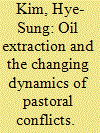| Srl | Item |
| 1 |
ID:
191856


|
|
|
|
|
| Summary/Abstract |
The destructive impacts of oil exploitation on the natural environment, which the inhabitants of the Niger Delta depend on for their livelihood, pose major threats to food security. Environmental damage alienates the local people from their ancestral lands and erodes their sources of livelihood. This study examines the effect of oil exploitation on the local people's access to sufficient, safe and culturally acceptable food. The study is based on data collected through interviews with key informants and Focus Group Discussions in the oil communities in Bayelsa, Delta and Rivers States. Environmental and livelihood sustainability are intricately interconnected. They have significant implications for food security of people in the oil-rich region. Nutritional adequacy is a necessary but not a sufficient condition for food security because cultural acceptability is also required. This study addresses the interplay between these factors and their implications for household food security in the Niger Delta.
|
|
|
|
|
|
|
|
|
|
|
|
|
|
|
|
| 2 |
ID:
191850


|
|
|
|
|
| Summary/Abstract |
Communities inhabiting the arid and semi-arid areas of eastern Africa have long suffered from and engaged in pastoral conflicts. However, since some countries in the region became oil producers, the conditions affecting pastoral conflicts have changed. This study examines how oil extraction may influence pastoral conflicts by using a survey experiment conducted in Turkana County, Kenya, on a sample of 801 respondents. The study finds that overall, respondents’ perceived risks of pastoral conflicts decrease when they are primed about the consequences of oil extraction leading to fundamental changes in pastoral livelihoods, such as an increase in employment opportunities in the oil sector and rapid social changes. The residents of Turkana view pastoral conflicts as customary as long as pastoralism continues and fundamental changes to pastoralism-based livelihoods originating from oil discovery and extraction may lead to a decrease in the pastoralist population engaging in pastoral conflicts.
|
|
|
|
|
|
|
|
|
|
|
|
|
|
|
|